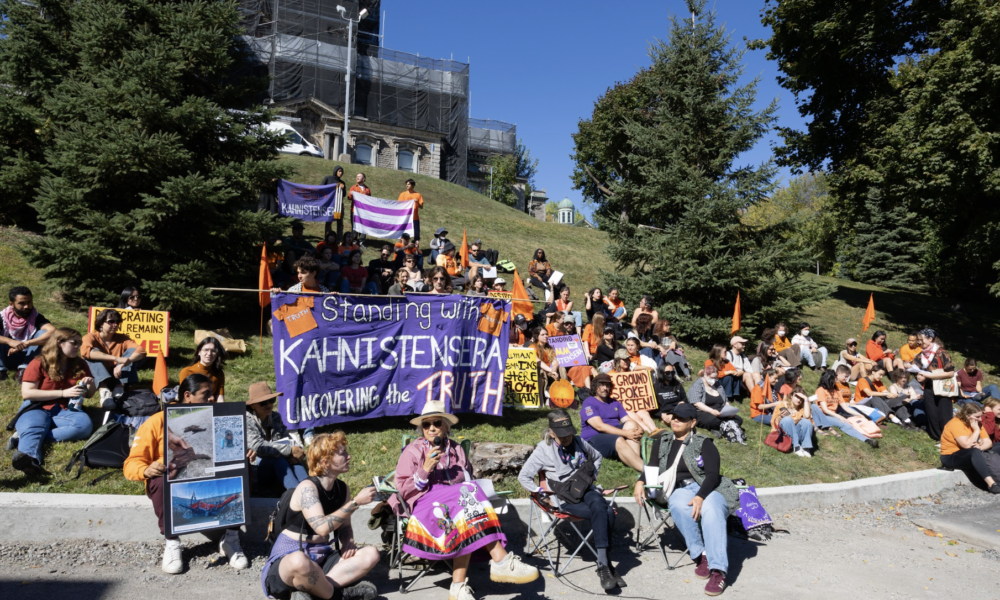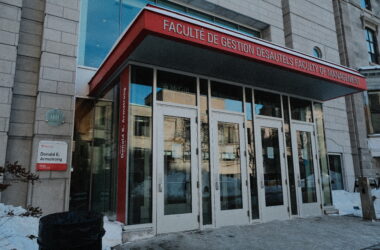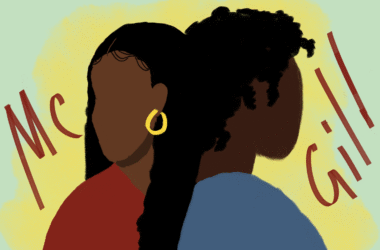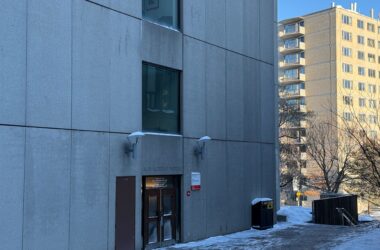At approximately 11:30 a.m. on Sept. 30, Canada’s National Day for Truth and Reconciliation, three Kanien’keha:ka Kahnistensera (Mohawk Mothers) addressed a crowd clad in orange at McGill’s Allan Memorial Institute, describing their ongoing legal battle with McGill and the Société québécois des infrastructures (SQI). The Mothers’ fight concerns the potential unmarked graves of Indigenous children they believe to be present at and near McGill’s New Vic site. At the press conference, the Mothers discussed a new interlocutory motion they were planning to file against the SQI to prevent further excavations on the grounds. On Oct. 1, they announced they would not be filing the motion.
The Mohawk Mothers shared during the press conference that they will be returning to Quebec’s courts to pursue new legal action in hopes of preventing the SQI from excavating locations around the New Vic site— some of which have been newly identified—that are potential sites of human remains.
Mother kwetiio emphasized in her speech that archeologists gathered evidence of newly-identified sites using three different technologies: Historic human remains detection dogs (HHRDDs), ground-penetrating radar (GPR), and a new S4 Subterra Grey probe designed specifically to detect human burials.
“The search dogs identified three other areas with the scent of human remains, along with ground penetrating radar and a special probe designed to find burials,” she reported.
Philippe Blouin, a PhD candidate in McGill’s Department of Anthropology and associate of the Mothers, explained in an interview with The Tribune that despite these potential burial sites being outside of the zone of McGill’s construction, the Mothers worry that the SQI still plans to excavate the area.
“The SQI […] announced that they will be coming into the zones where evidence has been identified […] to do excavations the same way they did in the past, meaning without any forensic precautions,” he said.
He explained the importance of protecting these specific sites, in light of the Mohawk Mothers’ claim that McGill has previously destroyed evidence during construction.
“[At McGill’s New Vic construction site], the damage was already done, and the Mohawk Mothers will be reserving the right to other legal recourses, […] for some sort of reparations,” he stated.
The Mohawk Mothers announced that, in light of previous methods of excavation by McGill and the SQI at the New Vic Site—which the Mothers claim violated their shared settlement agreement—they will seek renewed legal action to ensure that the new sites will not be excavated, moved, or destroyed throughout the ongoing legal battle.
However, the day after this press conference, on Oct. 1, the Mohawk Mothers received new information that they were unable to discuss with The Tribune due to the ongoing nature of these legal proceedings. Instead of filing the interlocutory motion they planned, they will be switching gears to a new course of action for protecting the potential unmarked graves at the newly identified Allan Memorial Institute sites.
Blouin emphasized that the Mothers’ goals remain the same, despite their legal tactics changing.
“We don’t know exactly how we will approach the interlocutory or emergency of protecting the area. We can’t state our strategy yet,” Blouin said. “But the same emergency stands, the threat to excavate the area with several pieces of evidence [in it] is still the [issue].”
Blouin also explained that the Mohawk Mothers have now been told that they should be ready for a full trial at the Superior Court of Quebec against McGill and the SQI by the end of March. The trial will discuss all the evidence of potential unmarked graves found on all sites and the question of whether McGill and the SQI have followed their obligations under their agreement with the Mohawk Mothers.
“[The trial] will determine retrospectively what should have happened, and the pieces of evidence will be examined there,” Blouin stated. “But in the meantime, we are really adamant that the SQI should not touch the ground at all.”
McGill’s Media Relations Office (MRO) said in a written statement to The Tribune that McGill has abided by their settlement agreement with the Mothers, and claimed that no evidence of human remains has ever been found on McGill’s New Vic construction site.
“No study nor analysis conducted to date suggests a plausible risk of human remains on the site of McGill’s project,” the MRO wrote. “Should human remains be detected, McGill would act with the utmost respect, stop work immediately and abide by the Settlement Agreement signed in 2023.”
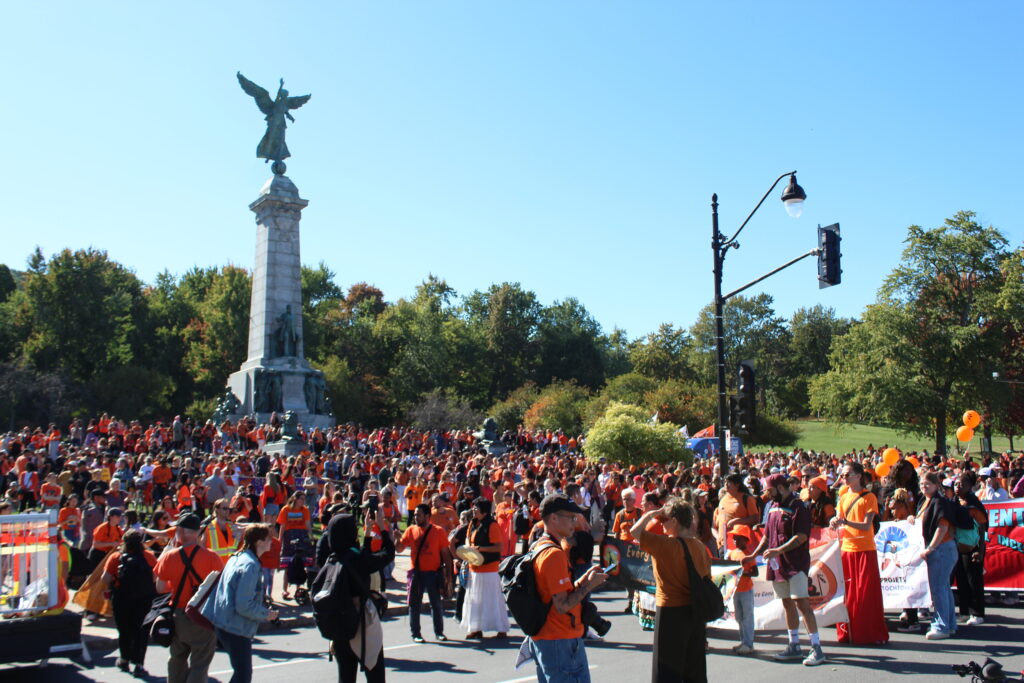
In her speech at the press conference, Mother kahentinetha shared how the Mohawk Mothers’ struggle with McGill and the SQI is a continuation of the struggle that Kanien’keha:ka Peoples have endured against colonialism for nearly 500 years.
“[Genocide], the ominous crime against humanity that Canada has been committing against us, […] continues to this day,” she stated.
kahentinetha explained that two years ago, after McGill dismissed the panel of archaeologists that was appointed to oversee excavations at the New Vic site, the Mothers obtained a safeguard order from the Superior Court of Quebec requiring McGill to respect their shared settlement agreement. However, McGill got the order overturned in the Court of Appeal in August 2024. kahentinetha emphasized how these actions stand in opposition to the principles of truth and reconciliation.
“What we see [at the New Vic site] is not only the hiding, but the very destruction of truth,” she stated. “We faced unprecedented pushback and gaslighting whenever we tried to make McGill and the SQI respect their own law and the very experts that they [hired].”
Mother kwetiio also explained the ways in which McGill specifically mishandled evidence of suspected unmarked graves at the New Vic site, prompting their case for the safeguard order.
“[The HHRDDs] found two small leather shoes in [the] soil,” kwetiio said. “Instead of sifting the soil immediately, it was left uncovered in big piles, rotting, exposed to the elements. Only four months later was the soil finally sifted, but not manually, as they were legally supposed to do. It was dumped into trucks and moved to another location to let McGill’s bulldozers in to start the New Vic project.”
Throughout the press conference, the Mothers reflected on their struggle in light of the National Day for Truth and Reconciliation, and implored the audience to do the same.
“[There is a] huge discrepancy between what this national holiday shows to the public and what is actually happening in real life for Indigenous people like us, trying to concretely protect and investigate the clandestine graves of our children,” kahentinetha said.
She directly called on the audience to think about what they can do to help the Mothers uncover the truth, by digging deeper into Canada’s full history.
“There are mass graves all over Canada, and we need to find them,” kahentinetha stated. “We need you to help us, […] to open those doors. These are your doors.”
After the Mothers’ press conference, attendees walked to the Monument de Sir George-Étienne Cartier on av. du Parc for the Every Child Matters March.
In an interview with The Tribune, McGill student Tarek Maussili, 2L Faculty of Law, shared the importance of attending the march and wearing orange on the National Day for Truth and Reconciliation.
“I wear an orange shirt because, you know, I’m honouring my grandmother,” Maussili said. “I’m honouring my mom. Both went to residential school. [….] And it’s to remind ourselves that the war is not over, right? This is a war. Canada is committing genocide, and we’re here to remember those that [were forgotten].”
